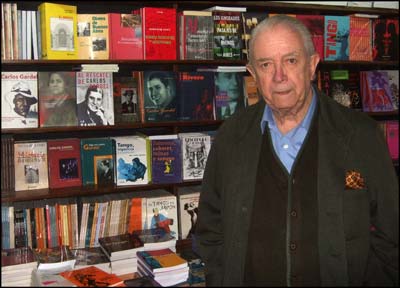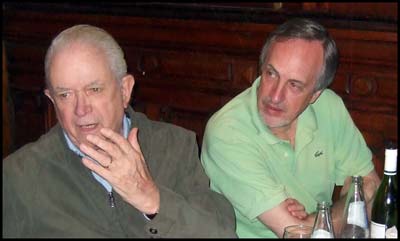By
Juan Carlos Esteban, life as a privilege

he researcher, educator, pal and friend, Juan Carlos Esteban, who has just passed away spent a privileged lifetime.
Riding along two centuries he released a singular oeuvre, which has been recognized and it is destined to last long. In the twentieth century his works about economy were expressed in the book: Imperialismo y desarrollo económico (Imperalism and economic development). This work is still recommended as basic text in the university. Borges used to encourage the reading of books which are at least a hundred years old «to avoid exposing oneself to the game of chance».
 As from the early days of the 21st century, Carlos Gardel, his background, life and environment gave origin to a literary output that has a foundational text: Carlos Gardel. Encuadre histórico.
As from the early days of the 21st century, Carlos Gardel, his background, life and environment gave origin to a literary output that has a foundational text: Carlos Gardel. Encuadre histórico.
After this work, every day in new books, forums, conferences and debates, the crusader Esteban went on with his intellectual battle aimed for Gardel’s revival.
He is included in the outstanding list of foundational authors. Contrary to the evolution of myth to logos, when Esteban handles his tools, myth overshadows any scientific approach about Gardel’s life.
A substantial change takes place. The accuracy of the work concerning the document put into the open an indisputable truth. There was no step back about regarding the background of the Artist.
Esteban got the admission ticket to transcendence. However, as a privileged one, after the lawsuits he underwent with the stubbornness worthy of his Basque DNA, he managed that Gardel was regarded as of public interest, becoming a matter of State.
At least, somebody would raffle off his soul.
These literary cycles and their controversies tell us about the public figure, the publicist who also approached tango as a genre, going deep into the concept of thematic twilight after the social changes he witnessed in these two centuries.
 This writer that had achieved so much decided to produce cultural politics. The challenge was not simple: it meant losing at peacetime what he had earned by researching. He succeeded again so that his positions were respected in initiatives brought before the governments of Argentina and Uruguay.
This writer that had achieved so much decided to produce cultural politics. The challenge was not simple: it meant losing at peacetime what he had earned by researching. He succeeded again so that his positions were respected in initiatives brought before the governments of Argentina and Uruguay.
The critical space of social gatherings had him as permanent attendee. Lunches and later encounters attest he was a generous, loyal, obsessive person.
At the time of his assisted death he had the privilege of dying in a dream and in his beloved Spain. His repatriation: a curious analogy with Gardel’s.
He would not stand the commonplace «rest in peace». Esteban was made with the debate’s substance.
These are only some of the reasons why he became an immortal. There is still a comment as an intimate whisper. We shall miss him... and far too much.